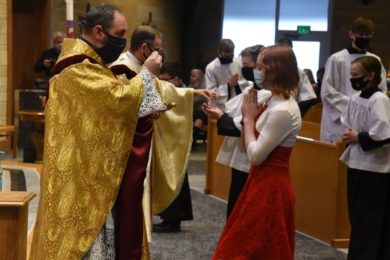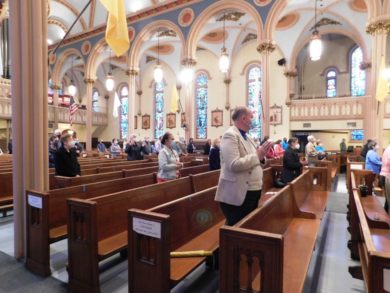June 22, 2021
GUEST COMMENTARY: Catholics should welcome all back to the table
REGIONAL
By Michael J. McGravey, Ph.D., Special to iObserve

Father Aaron Jenkins, pastor of St. Michael Parish in Greenfield, Ind., distributes Communion to Anne Bauer during Mass at the parish’s church Jan. 30, 2021. (CNS photo/Sean Gallagher, The Criterion)
“When will we return to normal?” That has been the question many of us have heard and considered over the past few weeks. As we welcome the first day of summer, vacation, and the end of school, this question is met with a great deal of anxiety.
Reflecting on the year, we encountered a great deal of anxiety centered on the novel coronavirus (COVID-19). Collectively, we can recall mandatory shutdowns and quarantine, mask and sanitation requirements, and, later, vaccine anxiety.
June 2021 provides even more for us to consider. Now, we worry about our children’s safety, especially those who do not have a vaccine available to them. We worry about those family, friends, and neighbors who have yet to receive the vaccine. Likewise, we worry about kitchen table issues: the cost of utilities, our salaries, insurance costs, amenities and necessities, and more.
Anxiety continues as we think about our summer travel destinations and whether or not the beach or pool is safe: “Are all guests vaccinated?” And certainly, we may continue to have anxiety about whether or not our employers, social spaces, and churches are safe to return to.
After living through a year of modified celebrations as well as postponed or cancelled events, we are all eager to return to “normal.” Our communal gatherings at church should be met with equal excitement. But it is going to take some effort on our part. It will require a new mission, one that asks that laity to invite their family, friends, and neighbors to return, and it must begin by meeting people where they are and maintaining a sense of those identical, relatable struggles.

Worshipers attend a recent noontime Mass at St. Michael’s Cathedral in Springfield. (iObserve photo/Rebecca Drake)
This new mission should spark a conversation about what is common. Many of us have experienced the same struggles and loss over the past year: economic distress, family challenges, and the absence of extended family in several cases. Those anxieties we are all mindful of (old and new) are ones members of our community likely faced and continue to struggle with.
This mission should bring us together, focusing on community and community building. Those involved should encourage the return of parish picnics, festivities, and block parties, not only for those who remained during a year of chaos but also those who have left the church. Finally, the mission should be aware of the vast differences within the community.
We should avoid any sense of purity tests of the faith; instead, begin a journey of listening to those who have been challenged not only by the church’s teachings or recent statements but also those who have been hurt by the church. The table Jesus offered to his diverse group of disciples (fisherman, tax collectors, mothers, sinners, etc.) should be the same table the church unfolds on its city block, its manicured grass, or in the basement of its parish center or school. The welcoming should have a chair and place for everyone, not just those who have “stuck with it.”
It will be up to the everyday folk, the “laity,” to bring back their friends, not for the purpose of indoctrination, but because we have experienced the past year in a similar state: We have battled the pandemic and now, we enter into a time of renewal and rebuilding. The need to be with those who have suffered is all the more important.
The church’s future depends on its willingness to be open to all those who need personal, spiritual renewal. And our children will be witnesses to a faith that sees the world, not as destroyed or in a dire post-pandemic state, but one that unites after tragedy and comes together as community. In doing so, the opportunity to invite the disaffiliated to the Lord’s table will no longer be an invitation to an intimate dinner party but a celebration of life in a post-turmoil world.

McGravey is assistant professor of religious studies at the College of Our Lady of the Elms in Chicopee.


 Facebook
Facebook Youtube
Youtube
